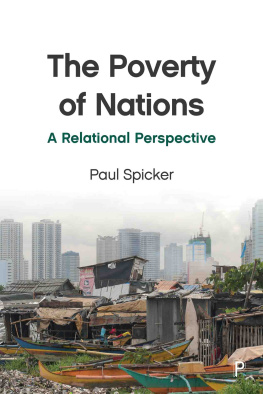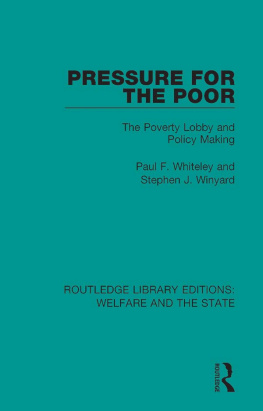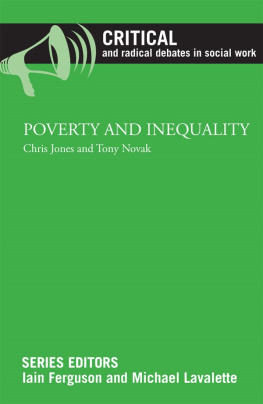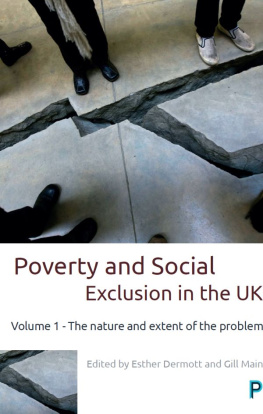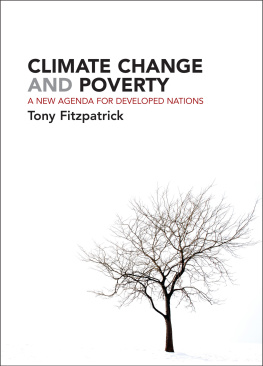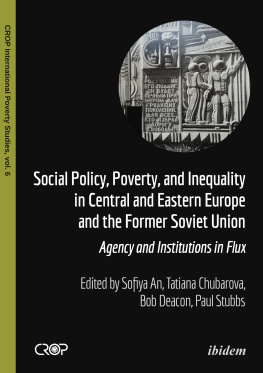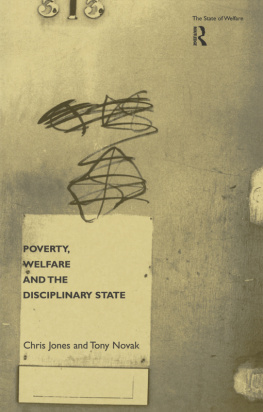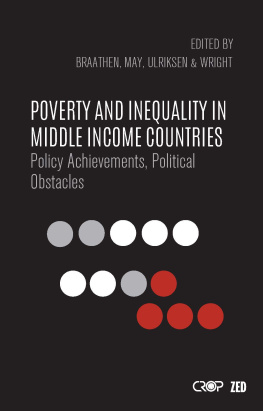First published in Great Britain in 2020 by
Policy Press University of Bristol 1-9 Old Park Hill Bristol BS2 8BB UK t: +44 (0)117 954 5940 www.policypress.co.uk | North America office: Policy Press c/o The University of Chicago Press 1427 East 60th Street Chicago, IL 60637, USA t: +1 773 702 7700 f: +1 773-702-9756 www.press.uchicago.edu |
Paul Spicker 2020
British Library Cataloguing in Publication Data
A catalogue record for this book is available from the British Library
Library of Congress Cataloging-in-Publication Data
A catalog record for this book has been requested
ISBN 978-1-4473-4332-5 hardback
ISBN 978-1-4473-4333-2 paperback
ISBN 978-1-4473-4335-6 ePub
ISBN 978-1-4473-4334-9 ePDF
The right of Paul Spicker to be identified as author of this work has been asserted by him in accordance with the Copyright, Designs and Patents Act 1988.
All rights reserved: no part of this publication may be reproduced, stored in a retrieval system, or transmitted in any form or by any means, electronic, mechanical, photocopying, recording, or otherwise without the prior permission of Policy Press.
The statements and opinions contained within this publication are solely those of the author and not of the University of Bristol or Policy Press. The University of Bristol and Policy Press disclaim responsibility for any injury to persons or property resulting from any material published in this publication.
Policy Press works to counter discrimination on grounds of gender, race, disability, age and sexuality.
Cover design by Clifford Hayes
Front cover image: Getty/Artur Widak/NurPhoto
Contents
Figures
Tables
Paul Spicker is Emeritus Professor of Public Policy at the Robert Gordon University, Aberdeen. His research includes studies of poverty, need, disadvantage and service delivery; he has worked as a consultant for a range of agencies in social welfare provision. His books include:
Stigma and social welfare (Croom Helm, 1984)
Principles of social welfare (Routledge, 1988)
Social housing and the social services (Longmans, 1989)
Poverty and social security: concepts and principles (Routledge, 1993)
Planning for the needs of people with dementia (with D S Gordon, Avebury, 1997)
Social protection: a bilingual glossary (co-editor with J-P Rvauger, Mission-Recherche, 1998)
Social policy in a changing society (with Maurice Mullard, Routledge, 1998)
The welfare state: a general theory (Sage, 2000)
Policy analysis for practice (Policy Press, 2006)
Liberty, equality and fraternity (Policy Press, 2006)
Poverty: an international glossary (co-editor with Sonia Alvarez Leguizamon and David Gordon, Zed, 2007)
The idea of poverty (Policy Press, 2007)
The origins of modern welfare (Peter Lang, 2010)
How social security works (Policy Press, 2011)
Reclaiming individualism (Policy Press, 2013)
Social policy: theory and practice (Policy Press, 2014)
Arguments for welfare (Rowman and Littlefield, 2017)
Whats wrong with social security benefits? (Policy Press, 2017)
Thinking collectively: social policy, collective action and the common good (Policy Press, 2019)
A range of his published work is available on open access at http://spicker.uk
This book is about poverty. It is distinctive in two ways: in the case it makes for a relational view of poverty, and in its attempt to draw out common themes relating to developed and developing countries.
Poverty is represented in many different ways. Here are some examples from around the world.
Many of the worlds poorest people are women who must, as the primary family caretakers and producers of food, shoulder the burden of tilling land, grinding grain, carrying water and cooking. This is no easy burden. In Kenya, women can burn up to 85 percent of their daily calorie intake just fetching water.
Poverty is a persistent problem for over 20% of the children in the United States. Child development is shaped by childrens interactions within and across social contexts. The social contexts in which children from impoverished backgrounds live can be devastatingly harmful: growing up in poverty exposes children to more stress or abuse in the home, neighborhood crime, and school violence. Exposure to environmental conditions associated with poverty profoundly shapes their development, and the effects become more pronounced the longer the exposure to poverty. Empirical studies from multiple social science disciplines have consistently documented crippling disadvantages across a number of developmental domains, showing that the disadvantages associated with poverty are entrenched, wide-reaching, and constitute an immediate and pressing policy challenge.
In our world, one in eight people live in slums. In total, around a billion people live in slum conditions today. The impact of living in these areas is life threatening. Slums are marginalised, large agglomerations of dilapidated housing often located in the most hazardous urban land e.g. riverbanks; sandy and degraded soils, near industries and dump sites, in swamps, flood-prone zones and steep slopes disengaged from broader urban systems and from the formal supply of basic infrastructure and services, including public space and green areas. Slum dwellers experience constant discrimination and disadvantage, lack of recognition by governance frameworks, limited access to land and property, tenure insecurity and the threat of eviction, precarious livelihoods, high exposure to disease and violence and, due to slums location, high vulnerability to the adverse impacts of climate change and natural disasters.
Poverty is both a cause and a consequence of poor health. Poverty increases the chances of poor health. Poor health in turn traps communities in poverty. Infectious and neglected tropical diseases kill and weaken millions of the poorest and most vulnerable people each year. Very poor and vulnerable people may have to make harsh choices knowingly putting their health at risk because they cannot see their children go hungry, for example. The cost of doctors fees, a course of drugs and transport to reach a health centre can be devastating, both for an individual and their relatives who need to care for them or help them reach and pay for treatment. In the worst cases, the burden of illness may mean that families sell their property, take children out of school to earn a living or even start begging. Overcrowded and poor living conditions can contribute to the spread of airborne diseases such as tuberculosis and respiratory infections such as pneumonia. A lack of food, clean water and sanitation can also be fatal.
The United Kingdom, the worlds fifth largest economy, is a leading centre of global finance, boasts a fundamentally strong economy and currently enjoys record low levels of unemployment. But despite such prosperity, one fifth of its population (14 million people) live in poverty. Four million of those are more than 50 per cent below the poverty line and 1.5 million experienced destitution in 2017, unable to afford basic essentials. Official denials notwithstanding, it is obvious to anyone who opens their eyes. There has been a shocking increase in the number of food banks and major increases in homelessness and rough sleeping; a growing number of homeless families have been dispatched to live in accommodation far from their schools, jobs and community networks; life expectancy is falling for certain groups; and the legal aid system has been decimated, thus shutting out large numbers of low-income persons from the once-proud justice system.

